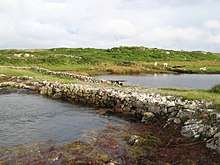causeway
English

Etymology
From Middle English cauceweye, with the first element from Anglo-Norman, Old Northern French caucee or caucie, cauchie (“route, highway”), from Vulgar Latin *calciāta (compare modern French chaussée from Old French chaucie, itself from the same source), either from Latin calx, calcis ("limestone"), or alternatively from Latin calciāre (“to stamp with the heels, tread”), from calx (“heel”). The second element corresponds to English way.
Pronunciation
- IPA(key): /ˈkɔːz.weɪ/
Noun
causeway (plural causeways)
- A road that is raised, so as to be above water, marshland, and similar low-lying obstacles. Originally causeways were much like dykes, generally pierced to let water through, whereas many modern causeways are more like bridges or viaducts.
- Account of the Old Bridge at Stratford-le-Bow in Essex from Alfred Burges, Esq. addressed to Sir Henry Ellis 1836
- . . .the passage over the water of the Luye at Stratford atte Bowe, anciently used to be in a certain place which is called the Old Forde, which is distant from the place where the bridges and causeway now are nearly one mile, at which passage many persons passing over it at divers times were drowned, and in great danger, and when after so much danger came to the knowledge of Lady Matilda, Queen of England, consort of Lord King Henry the First, she thereupon being moved with pity, sent for inquiry to be made where the bridges and causeway better and more advantageously might be made for the utility and easement of the county and those passing, and which being done, the same Queen caused to be built two bridges of stone, (to wit) one bridge over the water of Luye, at the end of the town of Stratford atte Bowe, and the other over another channel of the same waters towards Essex, which is called Channelsebridge, and also one causeway to be made between the same bridges, so that persons passing by well and securely might pass. And because the same Queen willed that the bridges and causeway aforesaid, so of her free alms made, from thenceforth for ever should be supported and repaired, she purchased certain lands, rents, meadows, and one water mill, which is called Wiggen Mill, and appointed and ordained the same for the support and repair of the bridges and causeway aforesaid.
- Account of the Old Bridge at Stratford-le-Bow in Essex from Alfred Burges, Esq. addressed to Sir Henry Ellis 1836
Derived terms
Translations
raised roadway
Verb
causeway (third-person singular simple present causeways, present participle causewaying, simple past and past participle causewayed)
- (obsolete, transitive) To pave, to cobble.
- 1879, “The Kinning Park proprietors v. the police commissioners of Kinning Park.”, in The Journal of Jurisprudence, volume 23, page 556:
- There had been a previous partial allocation, but the final allocation was made in 1875; and the whole sums payable by the owners of the streets for paving and causewaying them, as resolved upon by the Commissioners, have been duly paid.
This article is issued from
Wiktionary.
The text is licensed under Creative
Commons - Attribution - Sharealike.
Additional terms may apply for the media files.